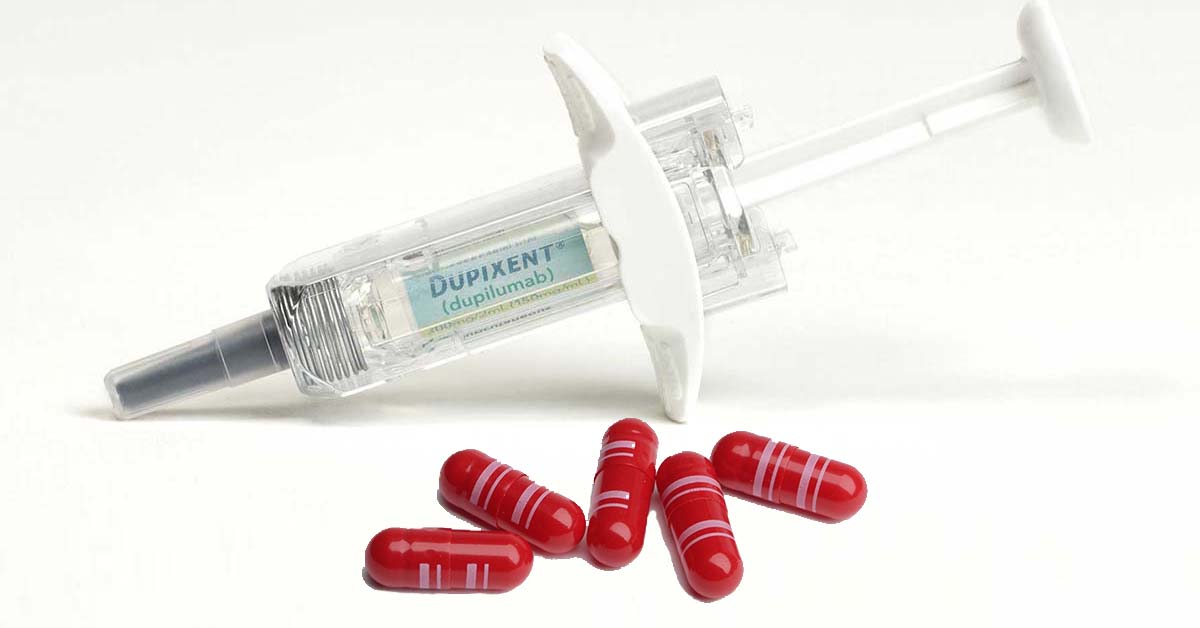As we reported last October, Aimmune, Regeneron and Sanofi are collaborating on a peanut allergy therapy that combines AR101 – Aimmune’s peanut oral immunotherapy candidate – with Sanofi’s Dupixent (dupilumab) – an approved drug for atopic dermatitis (eczema) in trials as a therapy for eosinophilic esophagitis (EoE).
Announcement of the Phase II trial of the combined therapy has been posted on the US National Library of Medicine Clinical Trials site and will soon begin recruitment.
The trial will compare the results of a cohort given AR101 and dupilumab with a cohort given AR101 and a placebo.
Study Description
Primary objective is to assess whether dupilumab as adjunct to AR101-Characterized Oral Desensitization Immunotherapy (CODIT) compared to placebo improves desensitization at the completion of up-dosing, defined as an increase in the proportion of participants who pass a double-blind placebo-controlled food challenge (DBPCFC) at week 28.
Secondary objectives are:
- To assess whether dupilumab as adjunct to AR101-CODIT compared to placebo improves desensitization at the completion of up-dosing, defined as an increase in the cumulative tolerated dose (log transformed) of peanut protein during a DBPCFC at week 28
- To assess whether dupilumab as (indefinite [continuously]) adjunct to AR101-CODIT compared to placebo maintains desensitization, defined as an increase in the proportion of participants who pass a DBPCFC at week 52
- To assess whether dupilumab as (limited [previously]) adjunct to AR101-CODIT compared to placebo maintains desensitization, defined as an increase in the proportion of participants who pass a DBPCFC at week 52
- To evaluate the safety and tolerability of dupilumab as adjunct to AR101-CODIT compared to placebo
- To assess the effect of dupilumab (compared to placebo) as adjunct to AR101-CODIT on the change in peanut-specific immunoglobulin E (sIgE), immunoglobulin G4 (IgG4), and peanut-specific IgG4/IgE ratio
- To assess if dupilumab increases the tolerability of AR101-CODIT as measured by the daily symptoms (e-diary) during the up-dosing phase
Eligibility Criteria for Participation
| Ages Eligible for Study: | 6 Years to 17 Years (Child) |
| Sexes Eligible for Study: | All |
| Accepts Healthy Volunteers: | No |
Criteria
Key Inclusion Criteria:
- Experience dose-limiting symptoms at or before the challenge dose of peanut protein on screening and not experiencing dose-limiting symptoms to placebo
- Serum Immunoglobulin E (IgE) to peanut of ≥24 kUA/L and/or a skin prick test (SPT) to peanut ≥10 mm compared to a negative control
- Participants/caregivers must be trained on the proper use of the epinephrine autoinjector device to be allowed to enroll in the study
- Participants with other known food allergies must agree to eliminate these other food items from their diet so as not to confound the safety and efficacy data from the study
Key Exclusion Criteria:
- History of other chronic disease (other than asthma, Atopic Dermatitis (AD), or allergic rhinitis) requiring therapy (eg, heart disease, diabetes, hypertension) that would represent a risk to participant’s health or safety in this study or ability to comply with study protocol
- History of frequent or recent severe, life-threatening episode of anaphylaxis or anaphylactic shock
- History of eosinophilic Gastrointestinal (GI) disease
- Severe unstable asthma at time of enrollment with Forced Expiratory Volume 1 Second (FEV1) <80% of predicted, Asthma Control Questionnaire (ACQ) >1.5
- Use of systemic corticosteroids within 2 months prior to screening
- Use of other investigation form of allergen immunotherapy within 6 months prior to screening within 6 months prior to screening
- Use of any agents known or likely to interact with epinephrine (eg, beta-blockers, angiotensin converting enzyme-inhibitors, tri-cyclic antidepressants, or other drugs), within 3 weeks prior to screening
- Allergy to oat (placebo in DBPCFC)
Note: Other protocol Inclusion/Exclusion Criteria apply
For more information
View the trial announcement at ClinicalTrials.gov.







I hope this works, would be great if they could also find a cure for soy allergy too if they manage to control immunoglobulin, as soy seems to be put in everything and is a nightmare. The fact that soy oil is not considered an allergen is ridiculous and it should be on packaging in the ingredients list. Tesco didn’t label it and I was ill for a month and went into hospital.